#Enterprise Software development Solutions
Explore tagged Tumblr posts
Text
Top Features to Include in Your Pharmacy Management App

As pharmacies embrace digital transformation, mobile and web-based management solutions are becoming essential to staying competitive and efficient. A well-designed pharmacy management app not only simplifies operations but also enhances customer satisfaction, improves regulatory compliance, and boosts overall profitability. To make your app truly effective, it must include the right set of features that support real-world pharmacy workflows.
Whether you're developing a standalone app or integrating it into a larger pharmacy automation software system, choosing the right healthcare software features is key to success. Let’s explore the top features that should be part of any modern pharmacy management app.
1. User-Friendly Prescription Management
At the core of any pharmacy app lies prescription management. This feature allows pharmacists to receive and process prescriptions from doctors or directly from patients. The app should support:
Uploading scanned or digital prescriptions
E-prescription integration from electronic health record (EHR) systems
Auto-verification of drug names, dosages, and interactions
Real-time prescription status tracking for patients
Prescription accuracy is vital for patient safety, and automation in this process significantly reduces the chances of manual errors.
2. Inventory and Stock Monitoring
An efficient pharmacy automation software solution must offer real-time inventory tracking. With so many medicines, categories, and expiry dates to manage, manual tracking is not just inefficient—it’s risky.
Essential inventory management features include:
Real-time stock levels and expiry alerts
Barcode/QR scanning for medicine entries
Automated stock reorder suggestions
Batch and lot tracking for recalls
This ensures that pharmacies never run out of essential medications and minimizes wastage due to expired stock.
3. Integrated Billing and Payment System
Modern pharmacy apps must offer seamless billing and payment options. This includes generating invoices, applying discounts, managing insurance claims, and processing digital payments.
Some useful billing features include:
One-tap invoice generation
Tax and GST calculations
Digital wallet and card payments integration
Insurance co-pay processing
By automating these functions, pharmacies can save time, avoid billing errors, and improve customer satisfaction.
4. Customer Profile and Purchase History
A powerful feature of pharmacy apps is the ability to store customer records and purchase history. This is especially important for managing chronic patients who regularly refill prescriptions.
Key functions include:
Patient profiles with medical history
Notifications for refill dates
Allergy and contraindication alerts
Recommendations for related OTC (over-the-counter) products
These healthcare software features help pharmacists provide more personalized service while supporting medication adherence.
5. Compliance and Regulatory Reporting
Staying compliant with local and national healthcare regulations is critical. Your app should have built-in support for regulatory compliance, particularly if you’re handling controlled substances or customer health data.
Include features like:
Audit logs for prescription records
Auto-generated compliance reports
Secure data storage aligned with HIPAA, GDPR, etc.
Alerts for Schedule H or X drugs
These tools protect your business from legal risks and help maintain a professional reputation.
6. Mobile Refills and Online Ordering
Consumers now expect convenience, especially in healthcare services. A pharmacy management app should allow customers to order refills, upload prescriptions, and track their order status—all from their mobile device.
Essential features include:
One-click prescription refill
Real-time delivery status updates
In-app chat with pharmacists
Push notifications for pickup or delivery
This not only improves customer retention but also expands your service reach without increasing foot traffic.
7. Automated Notifications and Alerts
Automation is a core pillar of pharmacy automation software, and timely alerts help ensure better service quality and operational efficiency.
Examples of automated notifications:
Stock-out warnings
Expiry date alerts
Refill reminders for patients
Payment due notifications
These alerts help staff stay ahead of issues and keep patients engaged in their treatment journey.
8. Reporting and Analytics Dashboard
Business intelligence is vital for long-term growth. A comprehensive reporting module helps pharmacy owners track performance, identify trends, and make informed decisions.
Important reports may include:
Daily/weekly/monthly sales reports
Most/least sold items
Inventory turnover
Profit margins by category
This feature adds strategic value and supports better inventory and sales planning.
9. Multi-Store Management (For Chain Pharmacies)
If you're developing a solution for a pharmacy chain, the app should allow centralized management of multiple locations. This includes synchronized inventory, unified customer records, and shared analytics.
Multi-store features typically offer:
Centralized admin control
Inter-store transfers
Branch-wise performance tracking
Location-specific offers or pricing
This enables scalable growth and streamlined operations across all locations.
Final Thoughts
Developing a pharmacy management app requires more than just digitizing basic workflows. To compete in today’s tech-driven healthcare environment, your solution must offer smart, user-focused, and regulation-compliant features. By integrating key functionalities like automated inventory, mobile refills, real-time reporting, and patient history, you can build a powerful pharmacy automation software platform that serves both pharmacists and patients effectively.
Choosing the right healthcare software features not only enhances operational efficiency but also ensures long-term profitability and compliance. With the right feature set in place, your pharmacy management app can truly transform how pharmacy businesses operate in the digital age.
#Enterprise Software development company#Enterprise Software development Solutions#Enterprise Software development services#healthcare software features
0 notes
Text
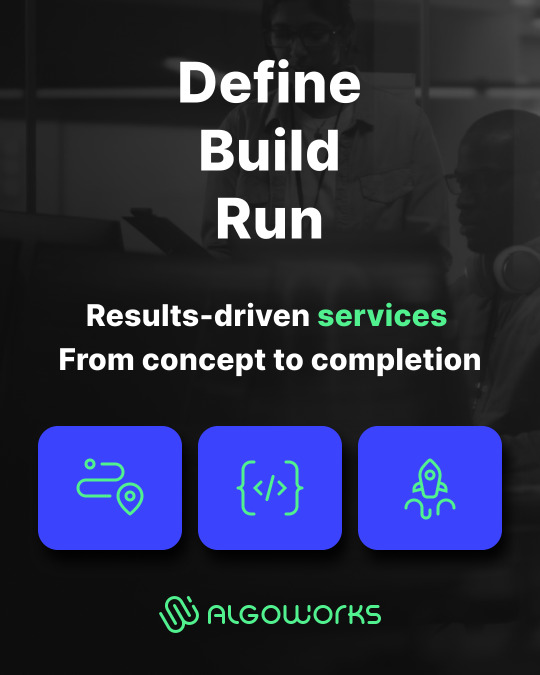
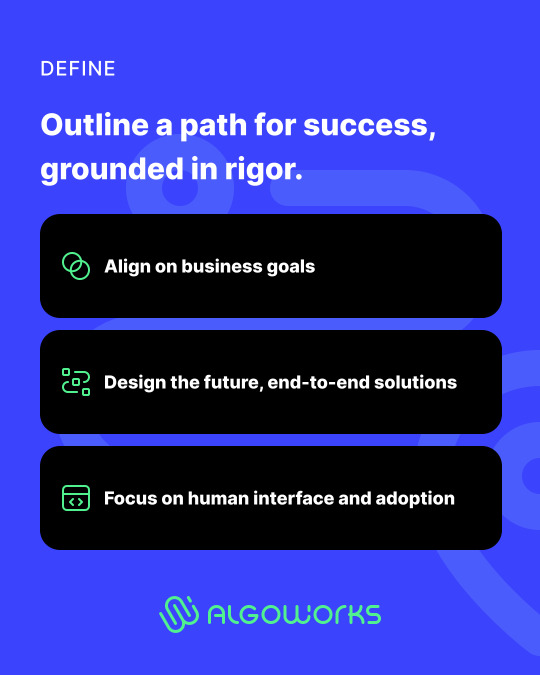

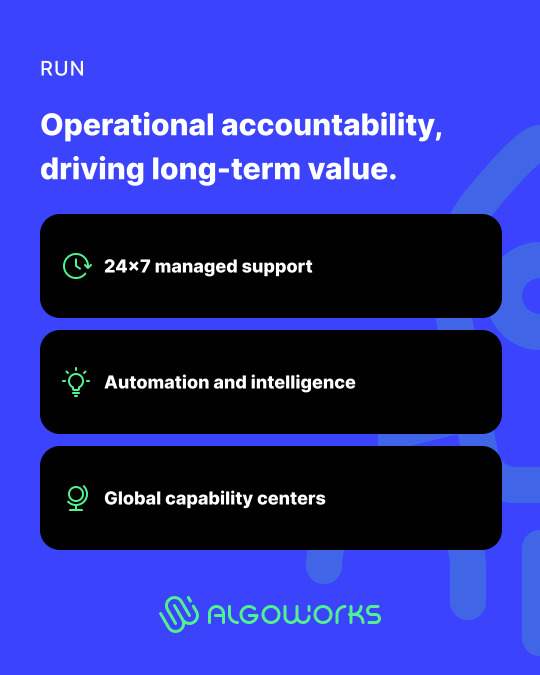
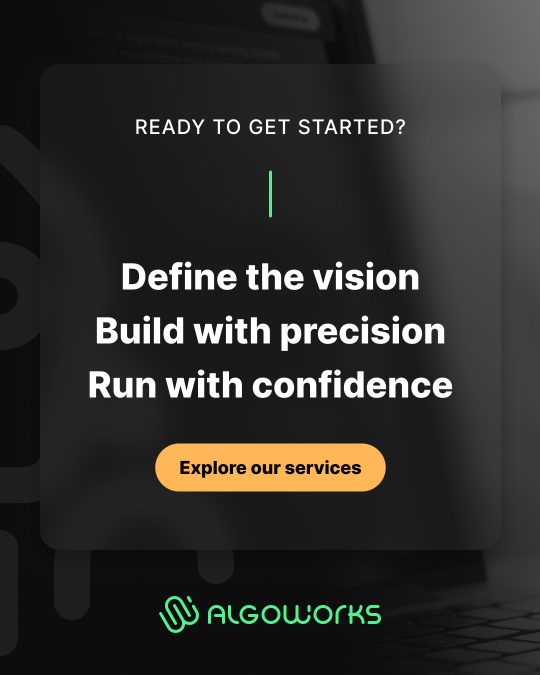
We follow our Define, Build, Run framework to execute flawlessly. From deep listening and 360° planning, to building with agile development and clean code, we ensure performance, security and return on investment through 24/7 monitoring and SLA-backed delivery.
Visit our website to learn more! https://www.algoworks.com/services/
#digital transformation#agile development#clean code#software engineering#cyber security#enterprise solutions#tech innovation#cloud services#innovations#technology#leadership#business excellence
2 notes
·
View notes
Text
What is Enterprise Fleet Management?

As is revealed in today’s world business environment, any organization must manage its resources appropriately. Thus, for companies and firms having major operations related to transportation and logistics, it becomes even more essential to manage their fleets.
Now, let’s start with the basics: what does enterprise fleet management mean? Now let’s discuss this idea and figure out how it can be of great benefit to the business processes.
Understanding what is Enterprise Fleet Management
Fleet management within an enterprise could be described as a strategic approach to managing and supervising such a company's vehicle fleet. The areas include its acquisition and maintenance, driver and vehicle management, and laws governing the automobile industry. Fleet management is prospective to optimize the operating costs and enhance the safety and productivity of both fleets and their drivers.
In an enterprise environment, fleet management goes beyond tracking the vehicles; it is more about getting improved ways of running organizations. Fleet management is important irrespective of whether it involves delivery vans, trucks, or even corporate cars if the business owns a set of cars for business use.
The outcome highlights the fundamental issues of fleet management.
Vehicle Acquisition and Disposal: Picking the correct car for your fleet, beginning from procurement to the time of disposal.
Maintenance and Repair: Managing to schedule vehicles for maintenance and repairs regularly to make sure that they are in good working condition to reduce time loss.
Fuel Management: Fuel efficiency management by controlling consumption and considering these to minimize fuel expenses by using fuel-efficient driving techniques and other energy resources.
Driver Management: Incorporating training and supervision of drivers as well as planning meals nt to support safety, compliance, and efficiency among the drivers.
Compliance and Risk Management: The safety of all the used vehicles as well as the used drivers with brutal and international requirements and managing of risk exposures of operating fleets.
Here we will discuss the concept of Fleet Management Software. Inefficiently managing all these components, many businesses turn to the use of fleet management software. This is because it acts as a platform for accessing any information regarding the fleet, including real-time data and automated operations of the fleet.
Key Features of Fleet Management Software
GPS Tracking: Precise vehicle location in real-time to increase efficiency and controllers.
Maintenance Scheduling: Schedule reminders in case of preventive maintenance and repairs to avoid ‘bottlenecks Management: Proper equipment that tracks fuel usage and gives an indication of wasteful activities.
Compliance Management: Material properties garages need to comply with set safety measures as well as regulatory requirements.
Driver Performance Monitoring: Measures to monitor and measure drivers’s performance, detect their training requirements, and incentivize them over safe behavior on roads.
Why Enterprise Fleet Management is So Important
To large companies, fleet management is not only limited to planning on how to ensure that vehicles are running. It’s about being able to harness data and technology in a way that will put you ahead of the competition. Effective management of fleets is known to have numerous benefits, such as cutting costs, satisfying customers, and reducing risks involving drivers and cars, among others.
However, due to emerging issues such as global warming, companies are now focusing on the use of fleets to be environmentally friendly. This is done through the optimization of routes, timely maintenance of vehicles, and training of the drivers to ensure they are conscious of the impact they make on the environment.
Being a web-based service, the most advantageous aspect related to an FMS or a Fleet Management Software Development Service is that it can be easily and effectively utilized across the corporate fleet range.
This has led to the increasing need for the development of fleet management software to be able to meet the expanding market need. Custom software, as the name suggests, is designed to improve organizational operations to suit a company’s needs, making it more flexible than packaged software.
A fleet management software development service typically includes
Consultation and Needs Assessment: Ah, awareness of the particular requirements and objectives of your fleet. You need to hire a professional fleet management software development company.
Custom Software Development: Constructing a custom fit that incorporates into the complex structures of the organization and fits the needs of the organization perfectly.
Integration with IoT Devices: The use of Internet of Things (IoT) devices such as GPS trackers or sensors to input real-time information and data.
Ongoing Support and Maintenance: Needed to make sure the software will continue to include all the features and incorporate the latest technologies and that it will cover all current needs of the business.
Conclusion
Okay, then, Fleet management is a system that encompasses all activities that involve control of a company’s fleet of vehicles with the use of the latest technologies in software and quality practices. Fleet management is not only a good idea but a necessity for any business that depends on transportation, where proper management of the company’s fleet is critical to achieving success.
Let it be a handful of vehicles or a multitude, the appropriate strategy in fleet management as enhanced by software changes the equation, provides steps towards optimizing your operations, lowers costs, and enhances the performance of an organization. The fast advancement of technology means that the means and ways used in the implementation of the strategies by the f managers are ever-changing and therefore a very promising industry to follow.
#business growth#fleet management#fleet maintenance#enterprise software#enterprise application development#business solutions#software#trending#viralpost#viral trends
2 notes
·
View notes
Text
Why Manufacturers Grow Faster With ERP Software
Introduction:
In the ever-evolving landscape of manufacturing, staying ahead of the competition requires more than just producing quality products. It demands efficient processes, streamlined operations, and the ability to adapt to changing market dynamics. This is where ERP (Enterprise Resource Planning) software steps in as a game-changer for manufacturers. In this blog, we'll delve into the reasons why manufacturers experience accelerated growth with ERP software and explore the significance of key ERP modules designed for the manufacturing industry. Let's unlock the potential of the best manufacturing ERP software and understand how it propels growth.
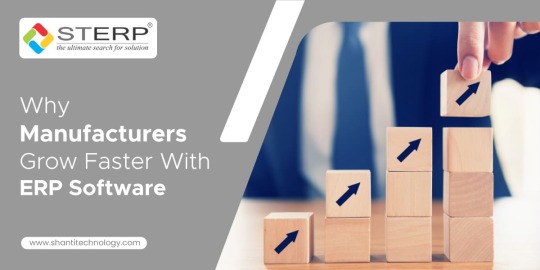
Understanding ERP Modules for Manufacturing Industry:
1. Supply Chain Management:
Effective supply chain management is at the core of manufacturing success. ERP modules for manufacturing industry streamline supply chain processes by providing real-time visibility into inventory levels, order status, and supplier relationships. Manufacturers can optimize procurement, reduce lead times, and enhance overall supply chain efficiency.
2. Production Planning and Scheduling:
Efficient production planning and scheduling are essential for meeting customer demands and minimizing downtime. ERP software enables manufacturers to create realistic production schedules, allocate resources effectively, and adjust plans dynamically in response to changing demand. This results in improved production efficiency and timely delivery of products.
3. Quality Control:
Maintaining consistent product quality is a non-negotiable aspect of manufacturing. ERP modules for quality control allow manufacturers to monitor production processes in real-time, track defects, and enforce adherence to quality standards. This not only ensures the delivery of high-quality products but also reduces waste and rework costs.
4. Inventory Management:
Managing inventory effectively is a delicate balancing act. ERP software provides manufacturers with tools to optimize inventory levels, track stock movements, and minimize carrying costs. With real-time insights into inventory status, manufacturers can prevent stockouts, reduce excess inventory, and enhance overall supply chain efficiency.
Manufacturing Enterprise Resource Planning Software: Unleashing Growth Potential
1. Streamlined Communication:
Effective communication is crucial for seamless operations. Manufacturing ERP software centralizes communication channels, allowing different departments to share information in real-time. This not only reduces the risk of miscommunication but also fosters collaboration among teams, leading to improved overall efficiency.
2. Data-Driven Decision-Making:
In the fast-paced world of manufacturing, decisions need to be swift and well-informed. ERP software aggregates data from various business processes, providing manufacturers with actionable insights. Data-driven decision-making becomes a reality, enabling manufacturers to respond proactively to market trends, customer demands, and operational challenges.
3. Scalability for Growth:
Growth is a constant objective for manufacturers. The best ERP for the manufacturing industry is designed with scalability in mind. As businesses expand, ERP systems can easily accommodate increased data volume, users, and additional functionalities. This scalability ensures that the ERP solution grows with the manufacturing enterprise, supporting its evolving needs.
4. Enhanced Customer Relationship Management (CRM):
Customer satisfaction is a key driver of growth. Manufacturing ERP software often includes CRM modules that allow manufacturers to manage customer relationships effectively. From order processing to after-sales support, ERP systems help manufacturers deliver exceptional customer experiences, fostering customer loyalty and driving growth.
Best ERP for Manufacturing Industry: Navigating Toward Success
1. Tailored Solutions for Industry Needs:
The best ERP for the manufacturing industry goes beyond generic solutions. It offers modules specifically designed to address the unique challenges and requirements of manufacturing operations. From managing complex bills of materials to handling production workflows, the best ERP software is tailored to the intricacies of the manufacturing sector.
2. Real-Time Reporting and Analytics:
Timely and accurate reporting is a cornerstone of effective decision-making. The best manufacturing ERP software provides robust reporting and analytics capabilities, allowing manufacturers to generate custom reports, track key performance indicators (KPIs), and gain insights into operational efficiency. This empowers manufacturers to identify areas for improvement and implement strategic changes.
3. Compliance and Regulatory Support:
Compliance with industry regulations is non-negotiable for manufacturers. The best ERP solutions for manufacturing industry include features that help businesses adhere to regulatory requirements. This not only ensures legal compliance but also mitigates the risk of penalties and reputational damage.
4. User-Friendly Interfaces:
User adoption is critical for the success of any ERP implementation. The best ERP modules for manufacturing industry prioritize user-friendly interfaces, making it easier for employees to navigate the system and perform their tasks. Intuitive interfaces contribute to smoother onboarding processes and overall system usability.
Conclusion:
In the fast-paced world of manufacturing, growth is not just a goal; it's a necessity. ERP software emerges as a strategic ally for manufacturers, propelling them toward accelerated growth by optimizing processes, fostering efficiency, and enabling informed decision-making. From the essential ERP modules for the manufacturing industry to the features that make the best ERP solutions stand out, manufacturers can unlock their full growth potential with the right ERP software. Embrace the power of ERP, and witness your manufacturing enterprise soar to new heights of success.
#ERP Modules for Manufacturing Industry#Manufacturing Enterprise Resource Planning Software#Best Manufacturing ERP Software#Best ERP for Manufacturing Industry#ERP Software for Manufacturing Industry#ERP System for Manufacturing Industry#ERP for Software Development Company#ERP Solutions for Manufacturing#India
6 notes
·
View notes
Text

Pell Software is proud to announce that we have been selected as a top US software development company by Techreviewer.co in 2024, for the second year running!
Our top rated software engineering team has helped hundreds of clients grow and improve their businesses by streamlining their operations and integrating their data.
We're excited for another year full of opportunities to help our clients grow and we're proud to be recognized for such an award!
#business software#custom software development#api integration#quickbooks#custom software solutions#custom software#quickbooks enterprise#custom web application development#quickbooks integration#software development
1 note
·
View note
Text
Inside an Odoo Development Company: A Systems Engineer's Perspective
Where process meets code, and complexity becomes a craft
Enterprise software is not just about automating tasks — it’s about structuring how organizations function. ERP (Enterprise Resource Planning) systems are the digital infrastructure that govern finance, supply chain, HR, manufacturing, and everything in between. Among the wide range of ERP systems, Odoo has emerged as a uniquely powerful platform — not because it’s ready-made, but because it’s designed to be made ready.
This modularity and openness, however, come with a cost: intelligent implementation. And that’s where an Odoo development company plays a role far beyond “installation.” Let’s walk through the landscape of what such companies actually do — from backend architecture to frontend UX, from ORM design to business rule orchestration — all written from the lens of real-world implementation.
1. Why Odoo Development Is Not Just “Customization”
It’s a common misconception that Odoo is plug-and-play. While it can be used out-of-the-box for small businesses, most mid-sized and enterprise organizations require development, not just configuration. This development can fall into several layers:
a. Model Layer (Database + Business Objects)
At its core, Odoo uses an object-relational mapping (ORM) framework layered on PostgreSQL. Each model represents a business object — and these are often extended or redefined to accommodate custom needs. A typical Odoo dev project will:
Define new models using Python classes inheriting
Extend existing ones using
Add computed fields, constraints, access rules, and indexes
Use inheritance modes to extend or replace logic without breaking core behavior
b. View Layer (User Interface)
UI in Odoo is generated dynamically via XML-defined views, QWeb templating, and now OWL components. Developers work with:
Form and tree views with field-level access controls
Kanban and calendar views for operational teams
Smart buttons, context actions, and domain filters
OWL (Odoo Web Library) for reactive frontend behavior, replacing legacy jQuery-based widgets
c. Workflow Layer (Automation)
ERP isn't static. It’s a set of flows, and Odoo allows for automating them using:
Server actions and automated actions
Scheduled cron jobs for background tasks (e.g., automated invoices, reminders)
Python-based workflows to replace deprecated legacy systems
Integration with webhooks and asynchronous queues (RabbitMQ, Redis) for non-blocking processes
This layered structure makes Odoo powerful but also demands structured engineering — which is the real product of an Odoo development company.
2. How a Real Development Team Approaches a Project
a. Discovery Is the Foundation
Before any development begins, the team must decode the business. This means interviewing users across departments, mapping legacy systems, documenting exceptions, and most importantly — identifying the real pain points.
For instance:
Does procurement get delayed because approvals aren’t centralized?
Is inventory data unreliable due to offline sync issues?
Are compliance reports being manually compiled because of disconnected modules?
These answers don’t map to technical specifications directly. But they define the problem space the team must solve.
b. Domain-Driven Design in ERP
Good Odoo developers think in terms of domain logic, not modules. They start by modeling the organization’s vocabulary — products, vendors, routes, agents, compliance stages — and translate that into structured data models.
This results in:
Clearly named classes and fields
Relationships that reflect real-world dependencies
Model constraints and validation logic that reduce bad data at the source
This also means resisting over-reliance on “default modules” and instead engineering clarity into the system.
3. Integration: The Hidden Complexity
Modern businesses rarely use a single system. Odoo has to talk to:
CRMs (Salesforce, HubSpot)
eCommerce platforms (Magento, WooCommerce)
Shipping carriers (FedEx APIs, EasyPost, Delhivery)
Tax systems (Avalara, GSTN, etc.)
External data feeds (EDI, SFTP, APIs)
Each integration requires:
API client development using Python’s libraries
Middleware for data transformation (especially when schemas differ)
Sync strategies (push vs pull, scheduled vs real-time)
Retry queues and failure logging
A good Odoo development company builds middleware pipelines — not one-off connectors. They create logging dashboards, API rate management, and monitoring hooks to ensure long-term stability.
4. Versioning and Upgrades: A Quiet Challenge
Odoo releases a new version yearly, and major changes (like the shift to OWL or new accounting frameworks) often break old code.
To survive these upgrades:
Developers isolate custom modules from core changes
Use test environments with demo data and sandboxed upgrades
Write migration scripts to remap fields and relations
Follow naming conventions and avoid hard-coded logic
This is an ongoing, code hygiene practice — not a one-time task. Dev companies that ignore this soon find their systems stuck in legacy versions, unable to adapt to change.
5. Performance Engineering Is Not Optional
A working ERP isn’t just functional — it has to be fast. Especially with large data volumes (10K+ products, 1M+ invoices), performance tuning becomes critical.
Typical performance interventions include:
Adding PostgreSQL indexes for filter-heavy views
Optimizing read-heavy models with Using in loops to avoid N+1 query patterns
Separating batch processing into async jobs
Profiling using Odoo’s logging levels, SQL logs, and custom benchmark scripts
The job of an Odoo development company isn’t just to make things work — it’s to make them scale responsibly.
6. UX Is a Development Concern
ERP systems often fall into the trap of being “complete but unusable.” Good developers don’t offload UX to designers — they own it as part of the codebase.
This includes:
Context-aware defaults (e.g., auto-filling fields based on last action)
Guided flows (like a wizard or checklist for complex processes)
Custom reports (using Studio, JasperReports, or Python rendering engines)
Mobile-friendly layouts for field workers
They treat user complaints (“It takes 12 clicks to approve a PO”) as bugs, not training issues.
7. Maintenance Culture: Logging, Docs, DevOps
Any real development team knows that the code they write today will be inherited by someone else — maybe even themselves in six months.
That’s why they:
Use structured logging for every transaction
Write internal documentation and comments with context, not just syntax
Automate deployments via Docker, GitLab CI/CD, and Odoo.sh pipelines
Implement staging environments and rollback mechanisms
A production ERP system is never done — and development teams must build for longevity.
Final Thoughts: ERP as Infrastructure, Not Software
Most people think of ERP as “tools that help a business run.” But from the perspective of a development company, ERP is infrastructure. It is the digital equivalent of plumbing, wiring, and load-bearing beams.
An Odoo development company isn’t a vendor. It’s a system architect and process engineer — someone who reshapes how data flows, how decisions are enforced, and how work actually gets done.
There’s no applause when a multi-step manufacturing process flows from RFQ to delivery without a glitch. But in that silence is the sound of a system doing its job — thoughtfully built, quietly running, and always ready to adapt.
#Odoo Development Company#Odoo ERP Development#Odoo Implementation Experts#Odoo Developers#Odoo Software Development#Odoo ERP Integration#Odoo Technical Consulting#Enterprise Odoo Solutions
0 notes
Text
#business solutions software#custom software development#development of software#full stack developer#ios app development services#it consulting#it services & consulting#mobile app development#software consulting#software development company#digital transformation#IT consulting services#business software solutions#software development services#enterprise software#technology consulting
0 notes
Text
youtube
Your Software Is Costing You More Than You Think
Not all software is built for your business - and that’s costing you. If you’re using generic systems full of workarounds and support tickets, your profits are shrinking behind the scenes.
✔ Discover what your software is really costing you ✔ Identify tech bottlenecks draining efficiency ✔ Time to rethink your digital infrastructure
📌 Don’t miss Part 2 - we’ll show you the better path.
Check out the original video - https://www.youtube.com/shorts/L9d0ZOudXxM
#Custom software vs off the shelf#Hidden costs of generic software#Tailored software solutions for business#Business software customization#Custom enterprise software development#Youtube
0 notes
Text
User-Centric Enterprise Software Development and Integration: Enabling Scalable Digital Transformation
In today’s fast-evolving digital landscape, businesses require flexible and user-centric software solutions that go beyond conventional SaaS offerings. Aryabh Consulting Inc. delivers tailored enterprise and application software solutions designed to solve unique administrative and operational challenges across industries.
User-Centric Software Development for Enterprises
At the core of Aryabh Consulting’s approach is a commitment to custom software development that evolves with the business. Unlike off-the-shelf systems, custom applications provide full code ownership and the ability to integrate new features as business needs grow. The team prioritizes understanding each organization’s journey and pain points to engineer solutions that truly fit.

Comprehensive Software Services and Solutions
Aryabh Consulting Inc. offers full-cycle enterprise software consulting and application development services, including:
Business Analysis & Strategy: Thorough needs assessments, strategic roadmapping, and technology stack evaluations.
Custom Software Development: Tailored applications for CRM, ERP, HR, and more, with support for microservices and legacy modernization.
Application Integration & Data Management: Ensuring data consistency and real-time flow through seamless integrations and analytics.
Cloud Solutions: Cloud strategy, migration, and hybrid/multi-cloud architecture planning using AWS, Azure, and Google Cloud.
Security, Compliance, and Scalability
Robust cybersecurity services include risk assessments, compliance management (HIPAA, GDPR), and identity & access management solutions. Aryabh Consulting also provides scalable DevOps implementation with CI/CD pipelines, Infrastructure as Code (IaC), and robotic process automation (RPA).
Future-Ready Digital Innovation
The company supports digital transformation with strategic advisory, AI/ML integration, and IoT implementation to build smarter and more connected enterprise ecosystems. Managed Services and Change Enablement Beyond deployment, Aryabh Consulting Inc. provides performance optimization, 24/7 help desk support, and user training to ensure long-term software success and adoption.
#custom software development#enterprise software solutions#application integration services#digital transformation consulting#scalable business software#DevOps automation#cloud migration services#secure enterprise software#Aryabh Consulting
0 notes
Text
0 notes
Text
Driving Business Agility Through Custom Enterprise Software Development
Why Custom Enterprise Software Is the Key to Agility In a fast-paced business world, agility isn’t optional—it’s survival. Off-the-shelf software can't always keep up with unique business demands. That’s where custom enterprise software steps in. From real-time insights to seamless integration and robust security, tailored solutions empower organizations to move faster and smarter.

Senrysa Technologies is leading this transformation—crafting scalable, intelligent systems for banks, government bodies, retailers, and more. The future? It’s all about AI-driven, adaptable enterprise tech that evolves as your business does.
#custom enterprise software#enterprise automation#enterprise mobility solutions#financial services technology#banking software development
0 notes
Text
Product Engineering Services Companies for Scalable Solutions

As businesses embrace digital transformation, the demand for high-performance, scalable software solutions continues to surge. With this in mind, evolving customer expectations, rising competition, and the need for rapid product innovation, many companies are turning to expert product engineering services companies to stay ahead. These specialized companies bring not just technical skills but a strategic approach that bridges innovation, agility, and scalability.
A reliable product engineering services company helps businesses accelerate development cycles, reduce time-to-market, and ensure robust quality across platforms. From ideation and UX/UI design to backend architecture, cloud integration, and ongoing optimization, their end-to-end capabilities empower businesses to build future-ready digital products. Indeed, in today’s software-driven market, a well-developed product can determine whether a business thrives or falls behind.
Therefore, this blog explores the growing importance of partnering with experienced product engineering services companies.
Understanding the Role of Product Engineering Services Companies
Product Engineering Services Companies offer end-to-end software development, from product ideation and prototyping to deployment, testing, and ongoing support. They focus on building not just functional software but highly adaptable, scalable platforms that evolve with business needs. Unlike generic development vendors, these companies adopt a product-first approach.
Their multidisciplinary teams, comprising business analysts, UI/UX designers, full-stack developers, cloud specialists, and QA experts, collaborate to create adaptable and scalable solutions. Additionally, a trusted product engineering services company ensures that your product stays aligned with evolving market needs, remains competitive, and is built for long-term success………….
#product engineering services#digital product engineering#scalable software solutions#agile development#cloud integration#software product lifecycle#MVP development#enterprise software development#AI-driven product engineering#top product engineering companies
0 notes
Text
NexaPent Technologies: Powering Growth with Smart IT Solutions, AI Hiring & Digital Innovation
In today's fast-paced digital world, it's clear that organizations need more than software; they're looking for IT solutions that are smart, flexible, and geared toward growth.
NexaPent Technologies recognizes this need and is committed to delivering intelligent IT services and solutions faster than its competitors.
About NexaPent?
NexaPent, located in Bengaluru, India, is an emerging leader in IT services and solutions, capable of leveraging talent and tools to mix AI recruitment, digital marketing, custom software development, and testing and quality assurance together. NexaPent offers organizations of all sizes a way to fit together an innovative digital experience for their customers that can help them innovate faster, hire smarter, and every digital experience is delivered at scale and at again posed cost.
NexaPent Technologies is a full-service IT consulting firm that solves real-world business challenges using technology. Their team of developers, QA engineers and testers, recruiters, and marketers works as an extension of your team to deliver on-time projects along with the pre-articulated budgets. Perhaps one of the things that differentiates NexaPent is that they are AI-first in their recruitment approach and can deliver a blended digital strategy with technology execution of solutions, not just services, they deliver outcomes.
Core Services at NexaPent
IT Recruitment (AI-Driven)
Finding talent in technology is hard. NexaPent simplifies this with AI-enabled IT recruitment services to identify, screen, and hire technology talent quickly. Here is what they offer:
Automated candidate sourcing
AI screening & filtering
No-show management (backup hiring)
Smooth onboarding support
High offer-to-join ratio
From developers to data scientists, NexaPent can make sure you hire the right talent, at the right time, without the stresses of technology recruitment.
Explore more: IT Recruitment Services
Digital Marketing Services
NexaPent's digital team produces high-impact, data-driven marketing campaigns that attract traffic, generate leads, and increase brand awareness. Their services include:
Search Engine Optimization (SEO)
Pay-per-click ads (PPC)
Social media marketing
Content creation & blogging
Email campaigns
Online reputation management
Generative Engine Optimization (GEO)
NexaPent develops strategies tailored to your business objectives to rank on Google and/or develop a loyal online community.
Custom Software Development
NexaPent develops web, mobile, and enterprise applications in the latest technology stacks. Their solutions are secure, scalable, and easy to use. Your digital ideas, whether it is internal business applications or client-facing applications, are brought to life.
Software Testing & QA
Quality is critical, and that is why NexaPent provides full QA services for applications, including:
Manual and automation testing
Performance and compatibility testing
Functional testing
Embedded and IoT testing
They ensure your product operates perfectly across all devices, platforms, and conditions before reaching the end customer.
Who Needs NexaPent?
NexaPent is a great fit for:
Startups launching tech products
Enterprises scaling operations
Companies need faster hiring
Brands looking to dominate search engines
Businesses upgrading their software infrastructure
Whether you need a marketing strategy, a new mobile app, or a team of developers, NexaPent provides end-to-end IT services you can trust.
Conclusion
In a hyper-competitive digital environment, the partners you choose determine your success. By partnering with NexaPent Technologies, you gain what is more than a service provider; you gain a growth partner.
If you seek to grow your business with smart technology, AI-enhanced hiring, and performance marketing capabilities, NexaPent is prepared for you to take the next step.
👉 Visit: https://www.nexapent.com 📞 Get in touch and future-proof your business today.
#NexaPent#NexaPent Technologies#IT services#software development#digital marketing#QA testing#AI-powered recruitment#technology consulting#IT solutions provider#Indian IT company#enterprise tech services#full-service IT firm#tech company Bangalore
0 notes
Text

https://www.istudiotech.in/custom-software-development-company-in-chennai/
iStudio Technologies is a top-rated custom software development company in Chennai offering scalable, secure, and high-performance software solutions tailored to your business needs. Their services span across enterprise software, SaaS platforms, ERP, CRM, and industry-specific applications. With a customer-focused approach and agile development process, they help businesses automate workflows and achieve digital transformation efficiently.
#Custom Software#Software Development Chennai#Enterprise Software#ERP Development#CRM Solutions#Business Automation#Tailored Software#SaaS Applications#IT Company Chennai#Software Developers India
0 notes
Text

#How Digital Marketing Levels the Playing Field for Small Businesses#In today’s fast-paced digital economy#small businesses often face stiff competition from large corporations with significantly higher budgets and established brand recognition.#digital marketing has emerged as a powerful equalizer. At Lavangi IT Solutions#a leading custom software development company Noida#we believe that strategic digital marketing can give small enterprises the edge they need to thrive in a competitive market.#Breaking Barriers Through Digital Channels#Digital marketing eliminates the traditional barriers of advertising by providing cost-effective and highly targeted marketing solutions. W#social media marketing (SMM)#content creation#and paid ads#small businesses can now reach global audiences at a fraction of the cost of traditional marketing.#As a custom software development company Noida#we’ve worked with several startups and SMEs to help them develop scalable digital marketing strategies that produce measurable results.#Tailored Strategies for Maximum Impact#Every small business is unique. Unlike one-size-fits-all solutions#digital marketing allows customization based on specific business needs#industry trends#and customer behavior. Whether it's improving Google rankings through SEO#building brand loyalty on Instagram#or driving traffic with PPC campaigns#our digital marketing experts at Lavangi IT Solutions#a trusted custom software development company Noida#craft strategies that deliver.#We empower our clients with data-driven insights#real-time analytics#and automated marketing tools to help them make informed decisions and stay ahead of the curve.#Leveling the Playing Field#The digital landscape provides equal opportunities to all — whether you're a neighborhood bakery or a tech startup. High-quality content#engaging social media campaigns
0 notes
Text
AWS and Open Source Headless CMS for Scalable Content | PenNep IT Solutions
#pennep india#pennep#Headless CMS#Open source headless CMS#Cloud computing services#Enterprise software development#Custom software development#IT consulting services#PenNep IT solutions#Pennep Jalandhar
0 notes